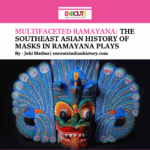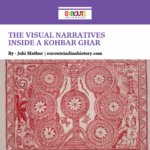Article Written By EIH Researcher And Writer
Ashray Goswami
It is a dark night, and you are listening to a story. The story is about a brave king trying to take a spirit on his back to a sage and listening to a story ending with a question that made us ponder for an answer. Almost everyone has heard such stories in their childhood, the stories that we hear from our grandparents. These stories can be dated back to an early medieval text called Vetala Panchavimshati or Baital Pachisi.
Baital Pachisi, which for many is as popular as Panchatantra, can be found in the works of Kshemendra and Somadeva of Kashmir. The popularity of the story of Baital Pachisi is owed to a large number of translations in vernacular languages. Surati Misar did the first recorded translation from Sanskrit in the eighteenth Century during the reign of Muhammad Shah. The work was translated to Braj-bhasha on the orders of Jai Singh Swai, Raja of Jaipur. The Twenty-five Tales of a Vetala was then translated into various languages, producing different retentions of the same.
Most of the stories describe the quest of King Vikram (Vikramaditya) to capture the wily spirit Betaal or Baital. The story begins with the arrival of a sorcerer at Vikram’s court. The sorcerer asks the king to capture Baital for the performance of a rite. The trick in his capture was that Vikram was bound to stay silent during his journey with Baital because if the king utters even a single word, Baital could escape his clutches and go back to his tree, from where he was initially captured. Knowing these terms, Baital narrated many stories to the king, always leaving them on cliffhangers and asking Vikram a moral question that he had to answer to save his life. As soon as the king speaks, the spirit frees himself from Vikram’s clutches and flies back to where he dwells. The cycle of capture, narration, question and answer went on to the point when the king was finally unable to differentiate and was out of answers.
The story of Baital Pachisi has been retold countless times in the form of folklore, texts, storybooks, comics, television series, and cartoons. A recent attempt to reinterpret the story in a real-world setting was made by writers and directors Gayatri and Pushkar in their movie Vikram Vedha (2017). It follows the story of two lead characters, Vikram and Vedha. Vikram is an honest cop with complete faith in the system. In many ways, the character of Vikram is the metaphorical representation of King Vikram of Baital Pachisi. Like Vikramaditya, who never doubts the sorcerer, Vikram believes in his colleagues’ and boss’s intentions. He wants society to eliminate evil and be the flag bearer of justice in the ailing society. Not yet bitten by the corruption of the system, he thinks that there is a specific line that distinguishes good from evil. For him, the world exists in black and white with no grey in between. Like this, Vikramaditya believed that by bringing the mischievous Baital to the sorcerer, his kingdom could be saved and become prosperous. Vikram and Vikramaditya had a particular scope for viewing the world and never tried to question the static nature of their morality.
However, can good and evil be differentiated so easily from one another? Here comes the character of Vedha, who casts doubt on Vikram’s morally perfect world of right and wrong. If Vikram was the personification of Vikramaditya, then Vedha was the living embodiment of Baital. Just as Baital attacks the conscience of Vikramaditya, makes him question his sensibilities, and fills the gap in his principles with pragmatism, Vedha makes Vikram question his ideology and beliefs, rendering him ambivalent. He makes Vikram skeptical of his world and causes him to reconsider his ethics. Contrary to Vikram, Vedha believes there is no distinct line between good and evil.
If Baital is the opposite of Vikramaditya, then Vedha is the antithesis of Vikram. By the end of Baital Pachisi and Vikram Vedha, both Vikramaditya and Vikram found themselves standing at the crossroads of the challenges posed by Baital and Vedha, respectively. The challenge is that the line of morality ends up getting blurred. It is not difficult to find the lesson from both stories applied to modern-day society, where everyone has their viewpoint of the world, refusing to see it from the other side.
Bibliography
Gopesh, Sushrut. The Symbolization Of “Vikram Aur Betaal” In ‘Vikram Vedha,’ Explained. October 3, 2022. https://dmtalkies.com/symbolization-vikram-aur-betaal-in-vikram-vedha-explained-2022-film/ (accessed October 28, 2022).
Manjeet, Singh. Vikram Vedha Remake: Three Core Elements That the Hindi Version Needs to Keep Intact. September 26, 2022. https://www.leisurebyte.com/vikram-vedha-remake-three-core/ (accessed October 28, 2022).
Platts, John. THE BAITÂL PACHCHISI or, The Twenty-Five Tales Of a Sprite. London: Wm. H. Allen & Co, 1871.
Tawney, C. H. “Appendix: The Twenty-Five Tales Of A Vetala.” In The Ocean Of Story Translation Of Somadeva’s Katha Sarit Sagara, 225-226. London: Chas. J. Sawyer Ltd., Grafton House, 1924-28.
Fig: Baital From Richard Francis Burton’s Vikram and the Vampire(1870). Source: Richard Francis Burton: Vikram and the Vampire, or Tales of Hindu Devilry. London: Longmans, Green, and Co. (1870). Retrieved From- https://commons.wikimedia.org/wiki/File:RF_Burton_Vikram_and_the_Vampire_(1870)_Illustrated_by_Ernest_Griset_page048.png



















